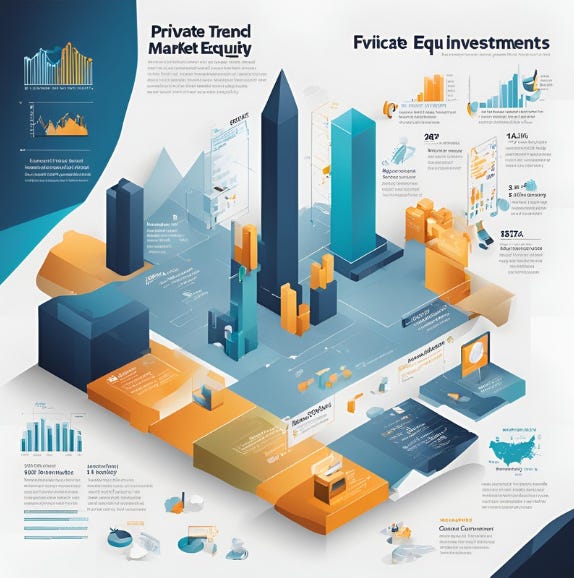Private equity has long been a dynamic component of the global financial landscape, offering investors the chance to unlock value through direct investment in private companies. However, the world of private equity is not static—it evolves in response to shifting market trends, economic cycles, and regulatory changes. In this post, we’ll explore current market trends influencing private equity, discuss what investors need to know, and provide strategies for navigating this complex arena.
Understanding Private Equity
At its core, private equity involves investing in privately held companies or taking public companies private to enhance their value. Private equity firms typically acquire stakes in companies with the goal of improving operational performance, restructuring underperforming assets, or driving growth through strategic initiatives. These investments usually come with longer holding periods and a higher risk profile compared to public market investments—but they can also offer significant rewards.
Key Market Trends Impacting Private Equity
1. Increased Competition and Deal Volume
Over the past decade, private equity has experienced unprecedented growth in deal volume. With more firms entering the space and institutional investors allocating greater portions of their portfolios to alternative assets, competition for attractive deals has intensified. This competitive environment can drive up valuations, making due diligence and deal structuring more critical than ever.
2. Technological Disruption
Digital transformation and technological innovation are reshaping industries across the board. Private equity firms are increasingly investing in tech-driven companies—from fintech startups to healthcare IT solutions—to capitalize on these shifts. Investors should be aware of how technology is not only driving growth but also altering risk profiles in sectors traditionally considered low-tech.
3. ESG and Impact Investing
Environmental, Social, and Governance (ESG) criteria are gaining traction in the private equity space. Firms are under growing pressure from investors, regulators, and consumers to incorporate sustainability into their business models. This trend is influencing deal selection, investment strategy, and the exit process. Investors now need to consider not just financial returns but also the broader impact of their investments.
4. Globalization and Cross-Border Transactions
Globalization continues to influence private equity, as firms seek opportunities beyond domestic markets. Cross-border transactions can provide access to high-growth regions, but they also introduce complexities like currency risk, regulatory differences, and cultural challenges. Understanding these factors is essential for investors looking to diversify internationally.
5. Economic Cycles and Market Uncertainty
Economic uncertainty, whether from geopolitical tensions, interest rate fluctuations, or pandemic-related disruptions, can affect the performance of private equity investments. While private equity is often seen as a long-term play, short-term market volatility can impact exit strategies and valuations. Staying informed about macroeconomic trends is crucial for anticipating potential headwinds.
What Investors Need to Know
Due Diligence Is Paramount
Given the complexity of private equity investments, thorough due diligence is essential. This means not only evaluating the financial health of a target company but also understanding its competitive positioning, operational risks, and growth prospects. Investors should look for experienced management teams and a clear plan for value creation.
Risk Management and Diversification
Private equity investments are typically less liquid and can be subject to significant volatility during economic downturns. Diversification across sectors, geographies, and investment strategies can help mitigate these risks. Investors should ensure that their private equity allocation aligns with their overall risk tolerance and financial goals.
Alignment of Interests
One of the key advantages of private equity is the alignment of interests between the investors and the management team. Investors should examine the fee structure, carry percentages, and performance incentives to ensure that both parties are motivated to drive long-term value.
Stay Informed About Market Trends
Investors must stay abreast of evolving market conditions. This includes following industry reports, attending investment conferences, and engaging with thought leaders. Being proactive in understanding market trends can provide early insights into opportunities and risks that may affect private equity portfolios.
Long-Term Perspective
Private equity investments typically require a longer time horizon than public equities. Investors should be prepared for a multi-year commitment and be patient through the inevitable ups and downs of the investment cycle. A long-term perspective is key to realizing the full potential of private equity investments.
Looking Ahead: The Future of Private Equity
The private equity landscape is poised for continued evolution as new market trends emerge. Technological innovation, increased regulatory scrutiny, and a heightened focus on ESG are likely to shape the strategies of private equity firms in the coming years. Investors who adapt to these changes by incorporating robust due diligence practices and a diversified approach will be better positioned to navigate this dynamic field.
Market trends in private equity reflect broader shifts in technology, globalization, and investor priorities. While the opportunities can be substantial, they come with inherent risks and complexities. By staying informed, practicing diligent risk management, and maintaining a long-term investment perspective, investors can better navigate the evolving landscape of private equity.
Whether you’re a seasoned private equity investor or just exploring alternative asset classes, understanding these trends is essential for making informed decisions and positioning your portfolio for success.
Note: Not financial advice.
Enjoy and be safe.




